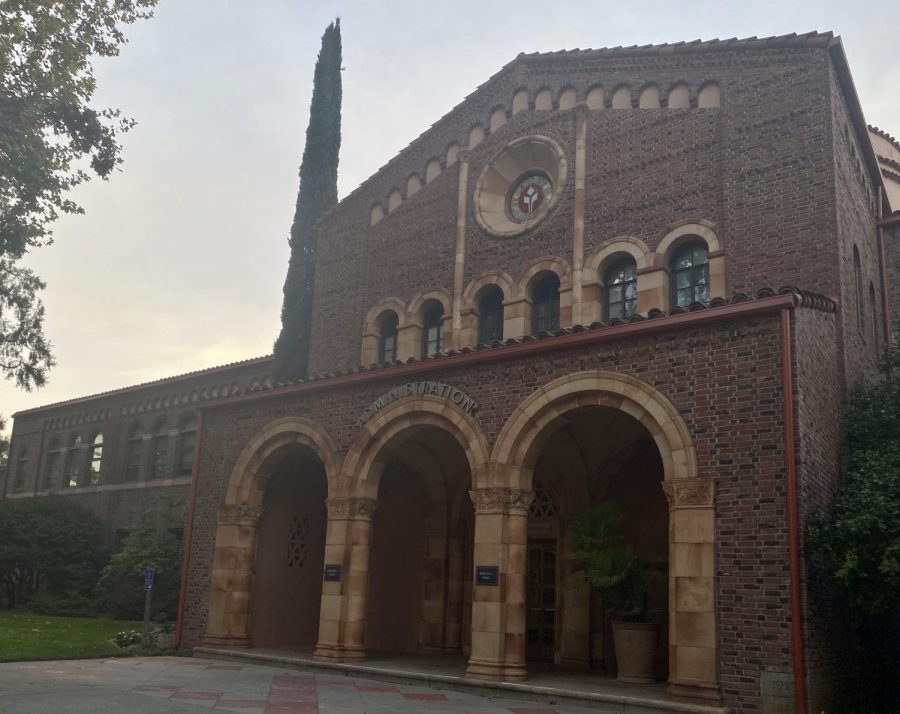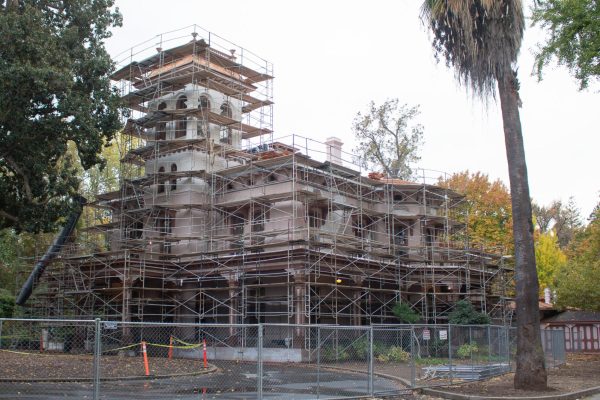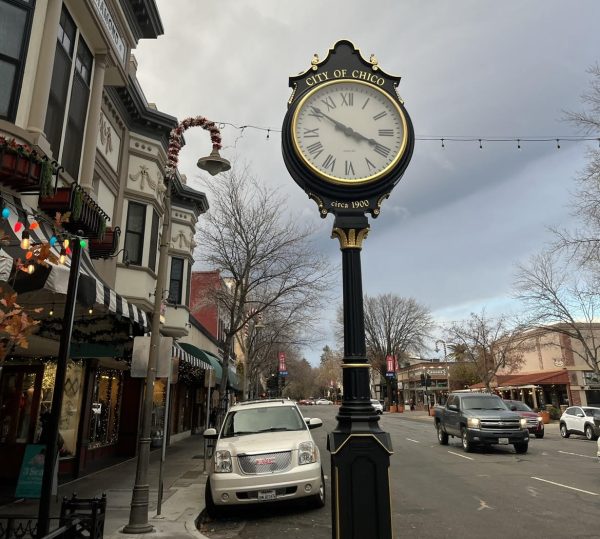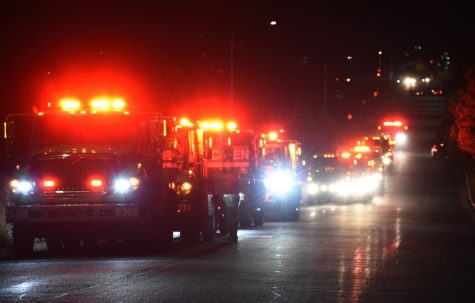COVID-19 spike for 18-24 year olds forced Chico State’s decision to close dorms, end remaining in-person classes
Kendall Hall on Sept. 1, 2020. Chico State’s Administration officially moves to fully online semester amid COVID-19 spikes, empties the dorms.
Chico State President Gayle Hutchinson hosted a virtual press conference on Sept.1 to address several concerns and newsworthy points regarding the university’s decision to cancel all in-person classes and remove roughly 500 students from campus housing.
“As we think about COVID-19 — and I don’t see it going away soon, we’ll begin planning for spring in a similar fashion that we did for fall, which will be predominantly online with limited face to face,” Hutchinson said.
Highlights from the press conference included:
- Chico State is preparing for the possibility of a virtual only Spring 2021 semester
- Enrollment has declined but Chico State administration does not believe it’s because of COVID-19 or the challenges of online instruction
- Approximately 500 students have to find off-campus housing or move home by Sept. 6, following the Sunday decision to close the dorms
- Approximately 115 students have applied for hardship housing at University Village
- Students moving off-campus will be reimbursed for housing and dining plan expenses
- The WREC may open for outdoor operations during Fall 2020
One week into the Fall 2020 semester, all in-person classes have been cancelled and moved to an online format and all dorm residents have been notified to move out of the dorms by Sunday, Sept. 6.
Since cancelling classes, Chico State’s administration has confirmed at least 67 COVID-19 cases on campus. Twenty-four University Housing residents are still quarantined in University Village and an additional 22 students have since returned home to quarantine.
Although Chico State has seen a spike in campus cases, President Hutchinson does not regret the decision to hold limited in-person classes and allow students to move into the dorms.
“We followed the CDC guidelines as well as the guidelines that were given out by Governor Newsom and also worked very closely with Butte County Public Health,” Hutchinson said. “All the plans that we prepared were in alignment with all those guidelines. And all those guidelines, if people could commit to the COVID commitments, then technically we should have been able to mitigate the spread.”
Over the summer, Chico State announced that the majority of fall classes would be online. Approximately 91% of the university’s course offerings began online and 8% were offered in-person.
“In May, we began planning for a predominantly virtual fall semester,” President Gayle Hutchinson said, “… this was a decision issued by the chancellor, Tim White, of the California State University and I endorse that as president of Chico State.”
The 8% translated to a few hundred course sections and the equivalent of about 2,500 students being enrolled in courses that would be instructed on campus. These classes were reserved for laboratory-style classes requiring special and unique equipment.
As August started, the administration became worried about upward trends in COVID-19 cases in Butte County, primarily among the 18-24 age group.
“We became concerned roughly 7-10 days ago as we were watching in Butte County, a spike between those 18-24 years old,” Hutchinson said. “What really was a turning point for us was the number of cases identified between the age group last Thursday on Aug. 27 when the county announced 71 positive cases in that age range.”
COVID-19 case numbers continued to rise in the following days — 33 cases on Aug. 28 and over 50 cases on Aug. 29, according to Hutchinson.
After these spikes, the administration pinpointed COVID-19 cases and exposure in the classroom and residence halls. The risk of greater exposure to the surrounding community pushed the university to move all classes to an online format and vacate most resident halls.
The number of residents living in the dorms this year was cut by more than half to roughly 750 residents to help mitigate the potential to spread COVID.
“Bringing them (students) back into the community and as we know, as we populate, the virus tends to spread that way,” Student Health Center Director Juanita Mottley said. “And just in the communal environment, this is when you have the higher risk of the virus and that’s what I can contribute to the spike in the numbers between the age group (18-24 year olds) and their behaviors.”
University Housing is trying to aid students in search of housing as the dorms close. University Village will be used for approximately 250 students who are vulnerable.
Associate Vice President for Budget and Operations Jeni Kitchell said there will be refunds for student housing and dining services for those moving out.
“For any students that do not receive the services they paid for, in terms of a lab fee, we would do a refund,” Kitchell said. “In a lot of these situations we are finding alternative ways to provide those materials or services to students.”
One hundred fifteen students with hardship circumstances have since applied for housing at University Village following Sunday’s announcement. The remaining 500 students will have to find off-campus housing or return home, although about 60 have already moved home.
All 47 resident advisors have the opportunity to continue living in University Housing and keep their job. Resident advisors will have spaces in University Village and work as student desk attendants with meal services included.
“We’re feeling really confident that we’re going to be able to help these students find the places they need — those that want to stay here,” Executive Director of University Housing Connie Huyck said.
Huyck said residents can look into current vacancies in Chico, subletting rooms and reaching out to off-campus housing services offered virtually by Chico State for help.
University Housing is working with students and parents unable to move out by the Sept. 6 deadline.
Students moving to University Village will have their own room and bathroom rather than the previous communal bathrooms offered in the residence halls.
Other on-campus services will continue to have limited operations.
There are discussions about possible use of the WREC.
Interim Vice President for Student Affairs and Dean of Students Sandy Parsons-Ellis said Chico State is “ … working to move some of the WREC equipment into a parking structure and provide that service outside.”
The Wildcat Health Center will not offer COVID-19 tests for students. Mottley shared that Chico State has been requesting tests since March but that local hospitals and public health are being prioritized.
Chico State has access to the machines that run COVID-19 tests, but the health center does not have access to the tests themselves.
Chico State enrollment has seen a decrease from Fall 2019 to Fall 2020, prior to COVID-19 complications.
“At this point, we have not seen a significant decrease in enrollment related to the virtual instruction that we had already designed at the beginning of this semester,” Kitchell said.
President Hutchinson expressed her confidence in Chico State students continuing their education at the university.
“I think it’s a challenging time for not only Chico State and Chico State students but all college students and everyone in the country at this time. So, no. Chico State is a great place. Once a Wildcat, always a Wildcat. I’m not concerned about folks going elsewhere,” Hutchinson said.
As the residence halls close this week and all classes shift to a virtual environment, a majority of campus services will continue to be offered in an online format for the remainder of the fall semester and perhaps into the spring.
Chloe Curtis can be reached at [email protected] or @ChloeCurtis__ on Twitter.









